|
|
|
Sort Order |
|
|
|
Items / Page
|
|
|
|
|
|
|
| Srl | Item |
| 1 |
ID:
168243
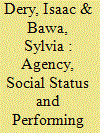

|
|
|
|
|
| Summary/Abstract |
This article examines contextually-grounded perspectives on the socio-political significance of marriage in contemporary Ghanaian society. Drawing on qualitative interviews among men and women in northwestern Ghana, this article argues that, beyond historicizing the institution of monogamous marriage, women’s agency in desiring, and navigating marriages are performatively agentic and tied to attaining a myriad of socio-cultural, economic and political capital. Situated within the constrained articulations of participants, our findings alert us to complex negotiations and manoeuvres through which men and women aspire for specific forms of masculinities and femininities within the larger gender hierarchies.
|
|
|
|
|
|
|
|
|
|
|
|
|
|
|
|
| 2 |
ID:
113858
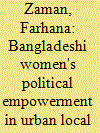

|
|
|
|
|
| Publication |
2012.
|
| Summary/Abstract |
Despite notably increased female involvement in local political bodies in Bangladesh, women continue to face multifarious problems in ongoing processes of shaping political institutions. Stereotypical gendered assumptions about divisions of labour continue to discourage such women from being present and active in the political arena. The article shows that this is not just a matter of Islamic traditionality. There are other factors at work, including lack of sensitivity to such issues among female leaders. Focusing on women ward commissioners, the study reveals specifically that they are frequently unable to show their commitment to the public as they are not assigned independent wards. When women share wards with male ward commissioners, their exposure becomes somehow insignificant to the public. Fieldwork confirms that women ward commissioners firmly believe that discriminatory attitudes of their male counterparts will continue unless they are given separate wards. This supports arguments for continued affirmative action at various levels to address gender balances in South Asian politics.
|
|
|
|
|
|
|
|
|
|
|
|
|
|
|
|
| 3 |
ID:
161356
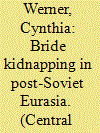

|
|
|
|
|
| Summary/Abstract |
Throughout Eurasia, bride kidnapping continues to be a fairly common way to get married. The practice is becoming increasingly controversial. Some local actors argue the practice is a cultural tradition, while others question its acceptability, particularly when a woman is forced to marry against her will. Many scholars, journalists and non-governmental organization workers view non-consensual variations of bride kidnapping as a form of gender-based violence. In October 2016, an interdisciplinary group of scholars gathered at the annual Central Eurasia Studies Society conference to assess existing scholarship on bride kidnapping in post-Soviet Eurasia. Using an innovative format, this paper offers an edited transcript of that roundtable discussion. The roundtable format provides readers an opportunity to see a diverse range of perspectives and opinions in response to several questions about bride kidnapping. This paper provides a thorough introduction to key issues surrounding bride kidnapping and offers suggestions for areas that need further exploration.
|
|
|
|
|
|
|
|
|
|
|
|
|
|
|
|
| 4 |
ID:
188947
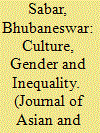

|
|
|
|
|
| Summary/Abstract |
This ethnographic paper explores gender inequality in tribal societies vis-à-vis customary practices and challenges the notion of egalitarianism of tribal society by taking Chuktia Bhunjia tribe of Odisha, India as an analytical category. In the light of a discussion on women specific taboos and restrictions, captured through formal interview, narrative and lived experience approach, the paper explicates the deeply embedded nature of the taboos in Chuktia Bhunjia society and unravels how prohibiting women from socio-economic and religious space, backed by purity-pollution philosophy, perpetuate the gender inequality among them. It was found that although economic division of labour is indistinct; women are perceived being portrayal of misfortunes during perceived pollution periods and are prohibited to enter into sacred places – kitchen room, cowshed, sacred groves and forest – and take part in community festivals and other auspicious occasions. The existing material culture, especially kitchen room, alongside economic structure, self-notion of ‘outsiders’ and apparently fixed customary laws have direct influence on the position of women in this society. It is found that the customary laws are not mere symbolic expressions in perpetuating the gender asymmetry, but have become a powerful tool to patriarchal controls not only over women’s education, health, properties and knowledge, but also over individual’s choice, freedom, decision-making and sexuality. However, internal challenges are reported against customary laws and taboos, the fear of social ostracism, the obligation to restore the purity of cultural entity and anxiety reinforce people to be always submissive to those practices. Therefore, unless there is transformation alongside their culture, it is fruitless to think of gender equality.
|
|
|
|
|
|
|
|
|
|
|
|
|
|
|
|
| 5 |
ID:
103280
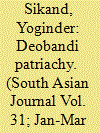

|
|
|
| 6 |
ID:
152449
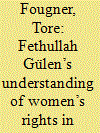

|
|
|
|
|
| Summary/Abstract |
This article examines the gender views of Islamist preacher Fethullah Gülen, a citizen of Turkey who has not only risen to global prominence since the early-2000s, but also gained a reputation for having ‘progressive’ views on the status of women in Islam. Considering Gülen’s writings on women’s identity, the relationship between men and women, and the role of women in public life, the article establishes that Gülen is more accurately depicted as deeply conservative with respect to women’s rights and gender equality. Furthermore, it identifies instances of tension between nature and nurture in Gülen’s conception of men and women, and locates his insistence on women naturally being of a subordinate kind within his sociopolitical project of creating an Islamic society.
|
|
|
|
|
|
|
|
|
|
|
|
|
|
|
|
| 7 |
ID:
156094
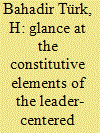

|
|
|
|
|
| Summary/Abstract |
Leadership is a major aspect of Turkish politics; leaders in Turkish politics are regarded as either almost sacred figures or the ultimate reason for all political, social and economic problems. Leaders are seen as decision makers who have a significant impact on almost all aspects of life. It can be contended that a historical continuance toward the leader-centered perspective is present in Turkish politics. This paper aims to present a descriptive framework outlining the elements that constitute the leader-centered perspective in Turkish politics. To accomplish this goal, the paper presents two major arguments. It is argued that the constitutive elements of the leader-centered perspective in Turkish politics are a sui generis synthesis of patrimonialism, patriarchy, populism and militarism. Furthermore, this fourfold historical structure strengthens forms of charismatic leadership and can provide insight into the central role of leadership in Turkish politics.
|
|
|
|
|
|
|
|
|
|
|
|
|
|
|
|
| 8 |
ID:
197058


|
|
|
|
|
| Summary/Abstract |
The representation of women in Indian politics has been low and inadequate, with women comprising only 14.4% of the members of the 17th Lok Sabha. Despite numerous policy measures aimed at promoting women’s political representation, the underrepresentation of women remains a persistent challenge. This study seeks to understand the intersection of culture and politics in explaining the underrepresentation of women in Indian democracy. The research explores the civic political culture of women’s political participation. The findings suggest that a change in the civic political culture, through a multifaceted approach, is crucial in breaking down the glass ceiling in Indian politics.
|
|
|
|
|
|
|
|
|
|
|
|
|
|
|
|
| 9 |
ID:
152535
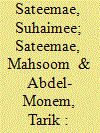

|
|
|
|
|
| Summary/Abstract |
Recent research on Muslim populations has offered interesting but limited insights about values preferences. This mixed-methods study examines the prevalence of support for patriarchy among a sample of religious Muslim university students in Southern Thailand using items from the World Values Survey. It also investigates the durability of these preferences by examining correlations between support or opposition to patriarchal values with preferences towards courtship practices, and elements that influence respondents’ views on gender roles, particularly related to the contemporary socio-economic and political situation facing the Muslim minority of Southern Thailand.
|
|
|
|
|
|
|
|
|
|
|
|
|
|
|
|
| 10 |
ID:
142061
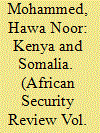

|
|
|
|
|
| Summary/Abstract |
Much research has been done on patriarchy in numerous contexts in Africa, contributing to an understanding of the phenomenon. Recent developments in Kenya and Somalia, characterised by the adoption of new constitutions against the backdrop of stringent patriarchal practices, prompted the writing of this article. Kenya's journey towards gender equality has not been an easy one, given that prior to 2010 – when its new constitution was adopted – customary law that endorsed the violation of women's rights held precedence. For Somalia, over two decades of civil war had encouraged lawlessness, which acted as a barrier for women's progress. With the two countries' new constitutions now in place, expectations are high that past hindrances will be eradicated. Kenya and Somalia stand a good chance of achieving gender equality if lessons from other countries can be carefully considered to avoid a repeat of their failures. Using secondary and primary data, it is this article's argument that an honest dialogue on women's rights involving all relevant stakeholders needs to be initiated to tackle the deeper structural problem of patriarchy, which poses a huge threat to the gains achieved on paper.
|
|
|
|
|
|
|
|
|
|
|
|
|
|
|
|
| 11 |
ID:
194020


|
|
|
|
|
| Summary/Abstract |
This essay is based on ethnographic fieldwork carried out among the Dimasas (of Assam and Nagaland) in Northeastern India. This Indigenous group has a system of double descent which places them separately from the other ethnic groups in the Indian subcontinent. In double descent, lineages are drawn through both the paternal and maternal lines of descent. The existing literature suggests that studies on double descent have mostly focused on ethnic groups in Africa, while not much research has been done on Dimasas or other Indigenous groups with double descent in the region. The paper attempts to fill the gap in South Asian anthropological literature on kinship discourses by focusing on the Dimasas of Northeast India. Further, by taking gender as an analytical tool, the paper attempts to explore the complex cultural contours of the double descent system, which intricately gets subsumed within the patriarchal setup in Dimasa society.
|
|
|
|
|
|
|
|
|
|
|
|
|
|
|
|
| 12 |
ID:
193910


|
|
|
|
|
| Summary/Abstract |
This study looks into a rising realm within Turkey’s culture industry, namely Islamic-oriented self-help culture, and explores the marriage advice offered by Islamic self-help authors and therapists on social media. Based on a discourse analysis of social media posts and the comments by followers, the study traces the meanings and discussions produced around problems in marriages in order to understand how Islamic self-help discourse relates to the hegemonization of a neoconservative understanding of gender relations in contemporary Turkey. The findings suggest that Islamic self-help advice on marriage bears ambivalences. On the one hand, it naturalizes traditional gendered power relations in marriage, glorifies an imagined ideal masculinity, and makes women responsible for ‘healing’ the problems in marriage. On the other hand, it raises discussions on previously silenced problems in marriages and advises women to improve their self-confidence and psychological strength, even though within the confines of traditional gender roles.
|
|
|
|
|
|
|
|
|
|
|
|
|
|
|
|
| 13 |
ID:
134374
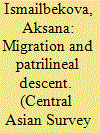

|
|
|
|
|
| Summary/Abstract |
Migration processes in Kyrgyzstan have given rise to fundamental social and demographic changes, meaning that many villages and town quarters are inhabited nowadays solely by women, children and the elderly, whereas younger and middle-aged men live as migrants elsewhere. This article explores the role of women in the maintenance of a strong patrilineal descent system, in the absence of their husbands or sons. This is achieved by grandmothers who play a significant role in transmitting oral genealogies and passing stories on to their children. Another role of women lies in changing the names of male relatives of their husbands; while appointing whom one should marry is also of great importance. The role of mothers-in-law in the formation of their sons' marriage ties in the latter's absence points to the powerful positions of these women. The final point is that young brides continue to live with their parents-in-law – even if their husband does not – and they must be respectful brides.
|
|
|
|
|
|
|
|
|
|
|
|
|
|
|
|
| 14 |
ID:
165965
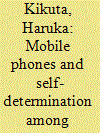

|
|
|
|
|
| Summary/Abstract |
This paper examines the new ways to navigate family power dynamics among Muslim youth in contemporary Uzbekistan. Migration of labour from Uzbekistan increased rapidly in the 2000s. When young workers began to experience the freedom of making their own decisions in their everyday lives after migration, they became uncomfortable with the elders of the household making decisions on everything from daily chores to serious matters concerning their families. Youth who continued to live in Uzbekistan also expanded their areas of self-determination, such as in choosing their spouses, by securing private space through the use of mobile phones. The mobile phone can be an effective tool to improve the position of young wives, who tend to have the lowest status in the husband's family. Thus, the existing hierarchy or classical patriarchy in Muslim families can be navigated, challenged and circumvented by the use of mobile phones among the youth today.
|
|
|
|
|
|
|
|
|
|
|
|
|
|
|
|
| 15 |
ID:
181927
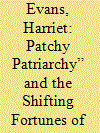

|
|
|
|
|
| Summary/Abstract |
The CCP's commitment to gender equality since 1921 has produced vast gains in employment and education for countless women while overlooking established gender hierarchies in family life. Long-term research in Beijing reveals that crossing class, sectoral and generational differences, there is an apparent paradox between women's increasing access to education and employment and their abiding attachment to ideas and practices associated with their roles as wives, mothers and daughters-in-law. A reconfigured “patchy” form of patriarchy is sustained by a dominant discourse of gender difference that naturalizes women's association with the domestic sphere. Unprecedented engagements with international feminism after 1995 introduced new approaches to gender equality. Recently, young feminists from diverse backgrounds have launched public protests targeting expectations of women in marriage and family life, marking a contestation of previous articulations of gender equality. Online platforms are flooded with exchanges about women's empowerment in a market environment that grants them considerable leverage to manage their marital and domestic relationships. The focus of this new generation of feminists on social reproduction signifies a radical departure from the classical Marxist principles underpinning earlier approaches to women's emancipation. Nevertheless, a “patchy patriarchy” continues to characterize widely held gender assumptions and expectations, spanning class and sectoral difference.
|
|
|
|
|
|
|
|
|
|
|
|
|
|
|
|
| 16 |
ID:
184784
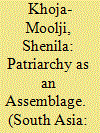

|
|
|
|
|
| Summary/Abstract |
This article contributes to recent debates about nuancing the idea of ‘patriarchy’ by drawing on Deleuze and Guattari’s notion of assemblage. It provides an account of patriarchy as a contingent yet persistent effect of human and material interactions wherein some molar forces aggregate and territorialise social relations around specific notions of womanhood, while molecular flows evade them. The particular set of interactions that this paper considers are configured through and around Qandeel Baloch, a social media celebrity from Pakistan, who was asphyxiated by her brother in 2016. In life, Baloch evaded several normative boundaries prescribed for middle-class Pakistani women. Riding the wave of social media expansion and an attentive youthful audience, she monetised male lust by transforming her body into a commodity, challenged self-appointed arbiters of religion, and mocked politicians. In death, she has been re-territorialised by mainstream media to conform to the social codes that bolster male domination. At the same time, she has been de-territorialised by feminist collectives that have produced their own normativity (or molarity) by erasing Baloch’s ambiguities and pronouncing her a feminist icon. Examining patriarchy as an assemblage of forces directs our attention to such heterogenous, even contradictory, movements wherein some pathways—male domination—are more heavily trafficked than others.
|
|
|
|
|
|
|
|
|
|
|
|
|
|
|
|
| 17 |
ID:
195234


|
|
|
|
|
| Summary/Abstract |
The 1980s was marked by the emergence of new cinematic forms in Turkey, including films concerning issues related to various forms of women’s oppression involving sexual objectification, rape, and subordination. Through a close textual analysis, this article discusses how the 1982 film Iffet attempts to create a rape–revenge story, romanticizing sexual aggression against women through hysterization of the protagonist. This study examines the film’s representation of the concepts of patriarchy, honor, virginity, and hegemonic masculinity within Turkey’s socio-political atmosphere in the 1980s. Mulvey’s feminist film theory and Brownmiller’s description of rape myths were used for the analysis.
|
|
|
|
|
|
|
|
|
|
|
|
|
|
|
|
| 18 |
ID:
142521
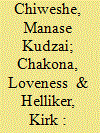

|
|
|
|
|
| Summary/Abstract |
In this article, we focus on patriarchy, women, land and livelihoods on A1 farms in Zimbabwe which arose from the fast track land reform programme. There is now significant literature on A1 farms in Zimbabwe. These studies include a number of ethnographic and comparative studies but this literature does not give sustained attention to patriarchy and women. In addition, though, a small number of works have appeared based upon a more focused gender analysis. We draw upon this more focused literature and offer fresh fieldwork evidence based on recent studies undertaken by two of the authors, in Goromonzi and Mazowe districts. At times, radical socio-spatial reorganisation such as fast track may destabilise systems of patriarchy. In the case of fast track, there has been a reconfiguration of relations between men and women yet this is uneven and contradictory and remains within the confines of patriarchal structures, practices and discourses. At the same time, women have manoeuvred and negotiated at local levels to enhance their lives and livelihoods.
|
|
|
|
|
|
|
|
|
|
|
|
|
|
|
|
| 19 |
ID:
169445
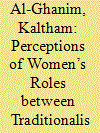

|
|
|
|
|
| Summary/Abstract |
Women’s participation in public life in the Arabian Peninsula is affected by tradition and limits their opportunities for socio-economic development. This study focuses on the social structures that impose gender inequality. Through in-depth focus group discussions with groups of men and women in different age groups and including both working and non-working individuals, gender roles are examined and the view of the different groups of men and women in Qatar of the roles that women are supposed to play inside and outside the home. Although some changes are occurring due to modernization, including education and other government policies, they are proving relatively minor: obstacles include deep-rooted kinship structure and cultural elements that limit women’s participation in the public sphere.
|
|
|
|
|
|
|
|
|
|
|
|
|
|
|
|
| 20 |
ID:
090884
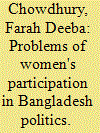

|
|
|
|
|
| Publication |
2009.
|
| Summary/Abstract |
Women's participation in politics is extremely limited in Bangladesh despite the country having had two prominent women leaders. Sheikh Hasina and Khaleda Zia gained the highest leadership positions in the government and the opposition through their family connections due to the low level of political institutionalization and the absence of suitable male heirs. By their family connections, they have overcome the problems that women otherwise face in politics. Why are Bangladeshi women not more prominent in politics? What are the problems women face when they participate in politics? Here the problems faced by women in politics in Bangladesh are analysed in both the public and the private spheres of patriarchy.
|
|
|
|
|
|
|
|
|
|
|
|
|
|
|
|
|
|
|
|
|